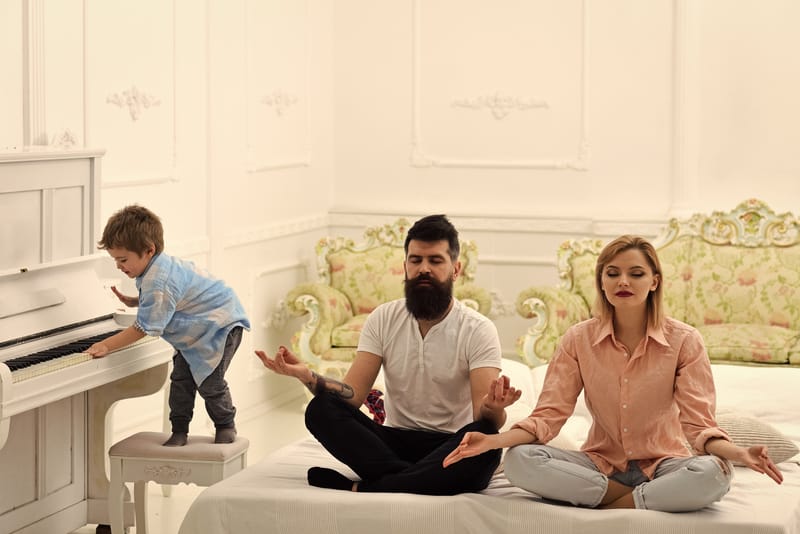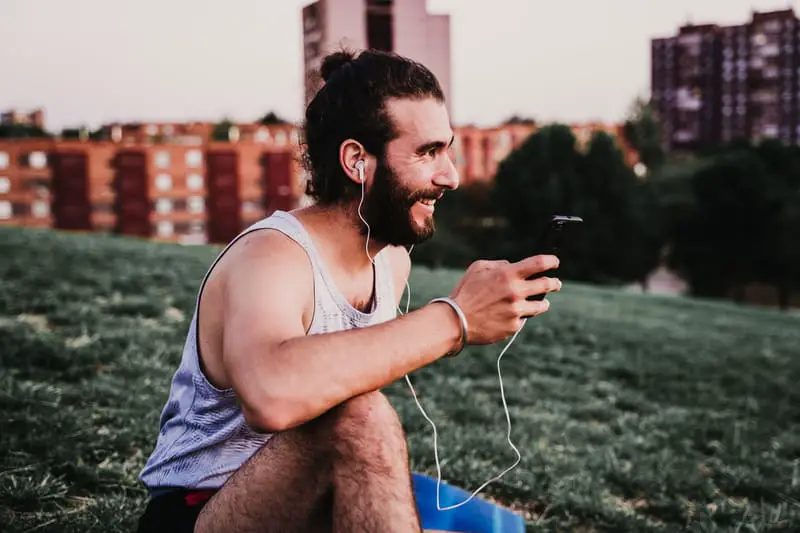Yogi approved by Keira Shepherd, Certified Yoga Instructor with a 1st Class Honors in Education Studies.
with a 1st Class Honors in Education Studies.
Music is considered the norm for most people when attending a yoga class. But how important is it?
In 2017, it was found that 4.9 million children and 35.2 adults were practicing yoga. This massive surge in popularity makes it even more important to understand the best ways to approach teaching yoga.
Traditionally yoga is not practiced to a background of music. Real ‘yogi’s’ highlight the importance of tuning into your inner voice during a yoga practice, whereas when playing music, it’s more likely that you would be listening to that over the inner workings of your mind and body. However, music has been an excellent means of introducing yoga into the Western world and making it more attractive to beginners who go to yoga for physical practice.
Both yoga and music have been consistently found to improve our wellbeing and make us feel good . So how can we use the two together to enhance our practice and not take away from all the good that can be gained from an hour spent flowing in our favorite class?
. So how can we use the two together to enhance our practice and not take away from all the good that can be gained from an hour spent flowing in our favorite class?
In this article, we will discuss the pros and cons of using music during yoga, things to consider when teaching yoga to music, and how a musical yoga class can be particularly beneficial to children with autism.
The cons of music in yoga

There are cons to everything, but this doesn’t mean that we should turn away from music during our yoga classes. What is important is that we understand the downside of adding music as a background to help us use music in a better way.
Yoga is an inner practice
Having stimulus other than the voice of the yoga teacher can move you into the room and outside of your body. In particular, music with words can make it more challenging to focus on practice.
Our bodies emotionally respond to music – certain melodies make us feel a certain way, while our brains react to harmonies, pitch, and lyrics. This can be a big distraction during a yoga class.
Loud music causes stress
Some teachers tend to put music at an unusually loud volume in the classroom. As much as we might enjoy listening to the newest songs at the most deafening volume in our car, it can make us feel stressed in the wrong situations . Loud and interruptive music can be particularly stressful when you’re already clawing your way through a fast-paced power or vinyasa class and has no place in more floor-based, relaxation-focused classes.
. Loud and interruptive music can be particularly stressful when you’re already clawing your way through a fast-paced power or vinyasa class and has no place in more floor-based, relaxation-focused classes.
Yoga is supposed to be meditative
Yoga is a form of meditation , and we would not meditate to pop music. We might, however, meditate to gentle, soothing sounds – it’s dependent on the type of music. A meditative state is a suggestible state, and we might be getting more than we bargained for if our brains respond negatively to the lyrics of the music.
, and we would not meditate to pop music. We might, however, meditate to gentle, soothing sounds – it’s dependent on the type of music. A meditative state is a suggestible state, and we might be getting more than we bargained for if our brains respond negatively to the lyrics of the music.
Music can block the teacher
It’s difficult enough learning the flow and how to move into particular poses without the added stress of not being able to hear instructions. Music can sometimes make it difficult to listen to instructions, consider that not all students will have as keen an ear as others in the class.
The benefits of music in yoga

We’ve looked at the cons and learned that it might be best to favor particular styles of music set at low volumes. Here are a few of the benefits of using music during yoga.
Music has helped with the popularity of yoga
Yoga can be intimate and too intimate for many. Music is a great way to ease into the practice and is something that has helped it to become so popular in the Western world. The Western world has turned to yoga for the physical benefits, and a class set to music can be more appealing for this purpose.
Music can encourage relaxation
Music can be the key to helping students relax during a class. Even things like a loud rumbling stomach can be enough to make people feel embarrassed and ready to walk away from yoga forever! Self-consciousness is less of a focus when there is music to distract. The more you practice, the more you will be able to turn inward and away from the body anyway!
Music can improve focus
During yoga, music gives us something to focus on other than our bodies. Concentrating on the music can clear the mind from stress outside of the studio and concerns over getting the practice ‘right’ inside the studio.
Though yoga is intended to be calming, beginners can find it difficult – their minds are buzzing with thoughts, and clearing them can take a lot of practice. Music can be crucial to getting a student to fall in love with yoga before turning inwards and noticing how the method is helping their mind.
Music can add to a class
Carefully selected music can be one of the best things about a yoga class. You can add so much to a class, and bring power with a well-curated playlist. Well-timed songs can be used to the ebb and flow with the class, as well as help students become more involved in their practice.
Can music help or hinder yoga practice?

We’ve discussed the pros and cons of using music in a yoga class, but ultimately does it help or hinder? Unfortunately, there is no direct answer to this; it depends on so many variables!
Here’s what you need to consider
A preference or dislike for music will depend on the individual teacher and the individual student. We’re yet to find a way of teaching that appeals to everyone, and I’m quite sure that it doesn’t exist! With that in mind, all students need to know that they can rely on the music to add value to the class and take nothing away from it. A right playlist takes time to design, but once you’ve got a few tucked up your sleeve, your work is done!
General rules are to keep the music low throughout the class and consider using no music during savasana. This is the time where students can tune into themselves and experience the wonders of that post-yoga buzz.
Yoga and music together can help you to reach a flow state where you are detached from reality, not thinking, just moving. Something that is particularly incredible to experience when practicing yoga alone give it a try!
Does the genre of music matter?
Different teachers will select different genres of music, some work, and some don’t. Generally, the music used during the class will go with the style of yoga – upbeat and current pop songs might not work in a yin class, for example.
Teachers must respond to the class and are not afraid to ask for feedback. You’ll see how engaged your students are between classes – note whether or not this has anything to do with the music and use it to better your following classes.
Upbeat music can be encouraging in fast-paced classes, and help students to move through the poses with more ease – it’s just like dancing! A first-timer to a vinyasa class is likely to lose their breath a little, but good music will ensure that they continue feeling happy as opposed to rushed and unable to keep up.
During slower-paced classes, it can be helpful to have instrumental music or no music at all to allow students to tune into the body a bit more. Music with lyrics is particularly distracting in these styles of yoga.
How can I use music when teaching yoga to children with autism?
According to the Centre for Disease Control, 1 in 54 children has autism in the US . Teaching yoga to children with autism is an incredible experience, and here’s how you can use music to make it even better.
. Teaching yoga to children with autism is an incredible experience, and here’s how you can use music to make it even better.
Studies have found that yoga practiced over 16 weeks improved the behaviors of children with autism. It’s also been found that music is uniquely therapeutic for children with autism. So how to combine them?
improved the behaviors of children with autism. It’s also been found that music is uniquely therapeutic for children with autism. So how to combine them?
Over-stimulation from outside sources can be an unpleasant experience for anyone, especially for children with autism. It’s essential to keep the music at a low volume, and probably best to stick to instrumental music.
Music and yoga have very similar benefits for children with autism; here are just a few:
- Emotional skill development
- Body awareness

- Self-awareness
- Self-regulation
- Focus
- Concentration
- Ability to communicate

These are vital life skills that are important to give attention to when working with children who have autism.
Music has also been found to help with language learning, maths, and sequencing in general. Yoga and music combined have the power to help children advance educationally in areas that they might be struggling with.
Music can make yoga a more calming experience , and allow children to focus on what they are doing without external distractions – the music will help to keep them focused on the present and what they are doing.
, and allow children to focus on what they are doing without external distractions – the music will help to keep them focused on the present and what they are doing.
Ultimately, the use of music during yoga classes depends on the philosophy of the yoga teacher. There is a lot to be said about both the pros and cons of using music during yoga, but it is perhaps something that should always be used when teaching yoga to children who have autism.
Music can add or take away from the value of a yoga class when not selected carefully – take time to create playlists and respond to your students’ likes and dislikes.
How To Use Essential Oils For Autistic Yoga Students

Keira Shepherd is a certified yoga teacher living in Toulouse, France. Originally from the UK, Keira received a First-Class Honours degree in Education Studies at Oxford Brookes University after completing her dissertation on the topic of using special technologies when teaching children with autism. Keira is a keen traveler and has spent a lot of time teaching a variety of different practices – such as yoga and scuba diving – around the world. Now settled in France, she is a mother of one and shares her passion for an environmentally sustainable life through her motherhood blog .
.
References
- https://www.aota.org/-/media/Corporate/Files/Practice/EvidenceExchange/Approved-CAPs/CY/Koenig-Edwards.PDF

- https://www.yoremikids.com/news/yoga-sensory-activities-for-autism

- https://www.huffpost.com/entry/music-in-yoga-class-harmf_b_638036?guccounter=1&guce_referrer=aHR0cHM6Ly93d3cuZ29vZ2xlLmNvbS8&guce_referrer_sig=AQAAAGfK8pWgPtgKLaXH2Ioa5K1K5f5ze-ivzksPQBlKRKwZk9Hr9QwYynKd8-DRsoKEQTK2lvr0E8Jbg-m4aN7_GOJHgPbDYJyeoxpYz3m3Am2KfPMdtymWmbpKZdWZIklhJXdmWQGFcRFfDy-cnRsvje53jyL98_setEiS4ELff2Wn

- https://www.cdc.gov/ncbddd/autism/data.html

- https://www.aota.org/-/media/Corporate/Files/Practice/EvidenceExchange/Approved-CAPs/CY/Koenig-Edwards.PDF

- https://www.ncbi.nlm.nih.gov/pubmed/21836799

